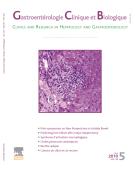Circulating free tumor DNA and colorectal cancer - 10/12/10
 , N. Ceze a, c, É. Dorval a, c, P. Laurent-Puig d
, N. Ceze a, c, É. Dorval a, c, P. Laurent-Puig dSummary |
Cancer is characterized by multiple somatic genetic and epigenetic alterations that could be useful as molecular markers for detecting tumor DNA in different bodily fluids. In patients with various diseases as well as in healthy subjects, circulating plasma and serum carry small amounts of non-cell-bound DNA. In this free circulating DNA, tumor-associated molecular alterations can be detected in patients who have cancer. In many instances, the alterations identified are the same as those found in the primary tumor tissue, thereby suggesting tumor origin from a fraction of the circulating free DNA. In fact, various types of DNA alterations described in colorectal cancer have been detected in the circulating free DNA of patients with colorectal cancer. These alterations include KRAS2, APC and TP53 mutations, DNA hypermethylation, microsatellite instability (MSI) and loss of heterozygosity (LOH). Also, advances in polymerase chain reaction (PCR)-based technology now allow the detection and quantification of extremely small amounts of tumor-derived circulating free DNA in colorectal cancer patients. The present report summarizes the literature available so far on the mechanisms of circulating free DNA, and on the studies aimed at assessing the clinical and biological significance of tumor-derived circulating free DNA in colorectal cancer patients. Thus, tumor-derived circulating free DNA could serve as a marker for the diagnosis, prognosis and early detection of recurrence, thereby significantly improving the monitoring of colorectal cancer patients.
Il testo completo di questo articolo è disponibile in PDF.Résumé |
Les altérations génétiques ou épigénétiques somatiques des cellules tumorales constituent un moyen d’identification moléculaire de la présence d’ADN tumoral dans un prélèvement biologique. De l’ADN libre est présent dans le sang et, chez les patients atteints de cancer, une fraction de cet ADN est d’origine tumorale. Chez des patients atteints de cancer, l’origine tumorale d’une fraction de l’ADN libre circulant a été démontrée au moyen de la détection d’altérations génétiques de l’ADN libre circulant plasmatique et/ou sérique identiques à celles mises en évidence au niveau de l’ADN extrait de la tumeur. Les altérations génétiques et épigénétiques les plus communes décrites dans le cancer colorectal ont été détectées au niveau de l’ADN libre circulant plasmatique et/ou sérique de patients atteints de cancer colorectal. Il s’agit principalement de mutations de l’oncogène KRAS2, de mutations des gènes suppresseurs de tumeurs APC et TP53, d’altérations de marqueurs microsatellites et d’anomalies de la méthylation de l’ADN tumoral. Grâce aux développements technologiques considérables réalisés dans le domaine de l’analyse de l’ADN, la recherche de nouveaux biomarqueurs du cancer colorectal basée sur la détection de l’ADN libre d’origine tumorale sérique ou plasmatique ou extrait d’autres prélèvements biologiques ouvre de nouvelles voies pour la mise au point de tests relativement simples et peu onéreux pour le dépistage, le diagnostic précoce de récidive, l’évaluation du pronostic et la prédiction de la réponse aux traitements.
Il testo completo di questo articolo è disponibile in PDF.Mappa
Vol 34 - N° 12
P. 662-681 - Dicembre 2010 Ritorno al numeroBenvenuto su EM|consulte, il riferimento dei professionisti della salute.

